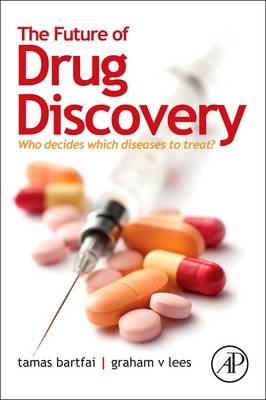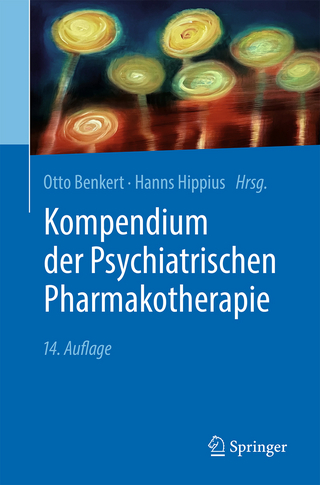
The Future of Drug Discovery
Academic Press Inc (Verlag)
978-0-12-407180-3 (ISBN)
The Future of Drug Discovery: Who decides which diseases to treat? provides a timely and detailed look at the efforts of the pharmaceutical industry and how they relate, or should relate, to societal needs. The authors posit that as a result of increasing risk aversion and accelerated savings in research and development, the industry is not developing drugs for increasingly prevalent diseases, such as Alzheimer’s disease, untreatable pain, antibiotics and more. This book carefully exposes the gap between the medicines and therapies we need and the current business path. By analyzing the situation and discussing prospects for the next decade, the The Future of Drug Discovery is a timely book for all those who care about the development needs for drugs for disease.
Tamas Bartfai was a student of mathematics, physics, and chemistry before translating his skills into biochemistry, pharmacology and neuroscience. Trained in Stockholm University, Yale University, and The Rockefeller University, he is presently a professor at The Scripps Research Institute, the University Oxford, and the University of Pennsylvania, and an expert in medicinal chemistry and the neurological sciences. He has been working in the development of new medicines and vaccines for many years as a former Sr.VP of Hoffmann La Roche, and long-term consultant at Astra, Novartis and, presently, Pfizer. Eight of the drugs Dr. Bartfai developed are in clinical use and three are in trials. He has trained and collaborated with many scientists throughout his scientific work on the topics of fever, neuropeptides, and prostaglandins, while publishing over 400 articles in over 80 journals. Dr. Bartfai has held many prestigious academic positions. He is a member of Academia Europae and the Hungarian Academy of Sciences, a fellow of AAAS for pioneering work on neuropeptides, and a member of the Royal Swedish Academy of Sciences, which awards the Nobel Prizes in Chemistry and Physics. He was professor of the Karolinska Institute, which awards the Nobel Prize in Medicine or Physiology. He has been awarded a number of prestigious prizes including Eötvös Medal for mathematics in 1966, Budapest, Hungary; Royal Swedish Academy’s Svedberg Prize for biochemistry in 1985 and Ericsson Prize in 1996; and the Ellison Medical Foundation Senior Scholar Award 2002. Graham V Lees acquired his BA, MA and PhD degrees at the University of Cambridge. His postdoctoral work on the biophysics of ion channels was followed by a lengthy career in scientific, technical and medical publishing with Elsevier (Amsterdam), Raven Press (New York), Academic Press (San Diego & London) and TheScientificWorld (San Diego, Boynton Beach, Newbury & Helsinki). His scientific writing has been actively increasing, including contributions to the textbook Fundamental Neuroscience; co-editing with Edward G. Jones and Lorne Mendell, and contributing to Neuroscience to Neurological Recovery for the Society for Neuroscience (SfN); and co-authoring The Future of Drug Discovery: Who Decides Which Diseases to Treat and Drug Discovery: From Bedside to Wall Street with Tamas Bartfai. He is interested in politics and social aspects of drug discovery. He has a profound ability to translate complex processes and ideas into more simple English that can be widely read. The authors’ previous book Drug Discovery: from Bedside to Wall Street, Elsevier/Academic Press, 2006, has been published in Japanese (Chem-Bio Informatics Society) and Mandarin (Science Press). Their later book’s Japanese and Mandarin editions are in preparation.
00 – Introduction for the non-specialist
01 – Why there will be new drugs despite the ongoing ‘crisis’ of drug development in big pharma
02 – The need for medicine grows
03 – Medicines are becoming better
04 – Which diseases do we want to treat?
05 – Therapeutic Areas: strategically important diseases for the future
06 – Blockbuster proprietary drugs versus generic drugs
07 – Why is pharma a special industry?
08 – Diagnosing towards personalized medicine
09 – Personalized medicine
10 – How much can drugs cost?
11 – Modeling Drug Discovery until 2025
12 – Drug development models between 2010 and 2025
| Erscheint lt. Verlag | 3.7.2013 |
|---|---|
| Verlagsort | San Diego |
| Sprache | englisch |
| Maße | 152 x 229 mm |
| Gewicht | 600 g |
| Themenwelt | Medizin / Pharmazie ► Medizinische Fachgebiete ► Pharmakologie / Pharmakotherapie |
| Medizin / Pharmazie ► Pharmazie | |
| Naturwissenschaften ► Biologie | |
| Technik | |
| ISBN-10 | 0-12-407180-5 / 0124071805 |
| ISBN-13 | 978-0-12-407180-3 / 9780124071803 |
| Zustand | Neuware |
| Haben Sie eine Frage zum Produkt? |
aus dem Bereich


